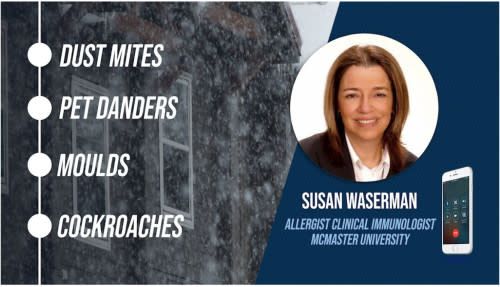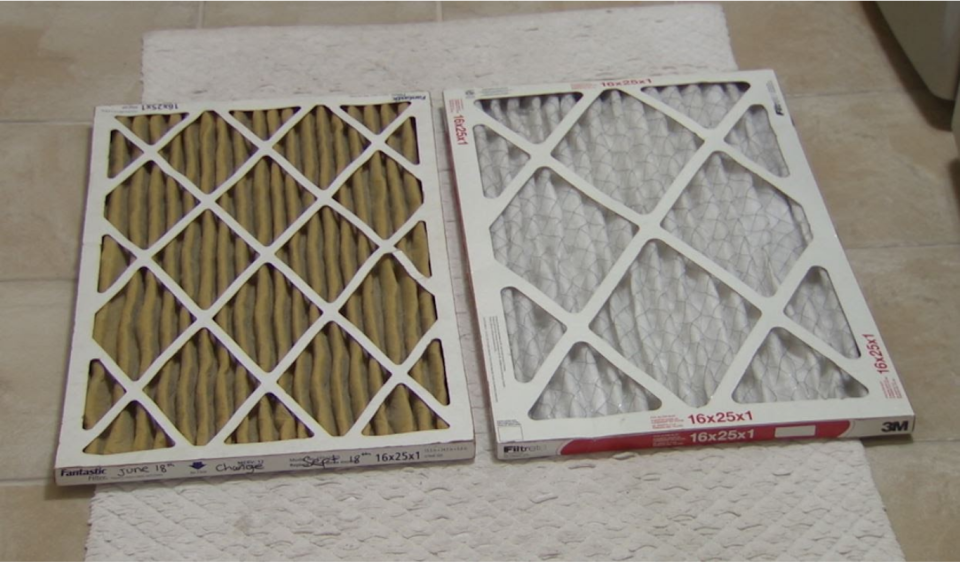How allergies thrive during winter, and culprits to watch for

Have you been feeling sneezy and stuffy lately?
You aren't alone, and it could be due one of several factors that arise during colder months.
Dr. Susan Waserman specializes in immunology and allergies and says dust mites, pet dander, mould, and cockroaches are typically the main culprits behind allergies experienced during the winter months. These allergies can also exist all year round; however, they seem to thrive in the winter. You can learn about each of these in the video above and by scrolling below.

DUST MITES
“More people are indoors, it’s cold and your house is more sealed up,” Waserman explains. “Also, people may be spending more time on household furniture and bedding which can increase build up of skin scales, for example — that’s food for dust mites.”

Graphic: The Weather Network
Another thing Canadians tend to do in the wintertime is humidify their homes. This actually encourages dust mites to grow and thrive.
“The best evidence for helping this situation is to keep humidity levels at 30–50% and to use dust mite protective coverings on mattresses and pillows,” recommends Waserman.
WATCH: Using your humidifier to battle the flu, why you need to turn it up
PET DANDER
Ventilation is likely the issue for pet dander allergies. And of course, because everything is drier in the winter, our pet's skin can flake just like ours, causing more dander to enter the air.
Keep on top of vacuuming, especially if your pet spends a lot of time on your carpet. Brush your pet (outside if possible) and clean up the excess hair immediately. Changing home air filters more often can also help.

Courtesy: The Weather Network
MOULD
“You will want to be aware of any excess moisture buildup in your home if you are allergic to moulds,” explains Waserman.
It’s a good idea to do seasonal checks around your home, and if mould is found, never let it sit. It needs to go immediately.
COCKROACHES
Cockroaches are not only a cringy nightmare to deal with, but they can also spark an allergic reaction. The reason we may see cockroaches is due to food being left out, crumbs on the floor, or dirty dishes being left in the sink. They also want a warm place to settle in for the winter, and they can get into your home through the smallest of cracks.
You’ll want to seal any entryways, and if you do have an infestation, a pest professional is likely your best resource.
WHAT TO DO AROUND THE HOUSE
As many Canadians hunker down throughout the colder months, coughing and sneezing due to indoor allergies may become more prevalent. Your sealed up home could lack the proper ventilation you need in order to alleviate indoor allergens. Here are some quick steps you can take in order to help improve the situation:
Change home air filter
Vacuum often
Clean crumbs and dirty dishes off countertops immediately
Limit time pet food is on the floor
Brush pet often and outdoors if possible
Protect pillows and mattresses with mite proof covering
Keep humidity levels between 30-50 %
Medicate yourself with allergy products when necessary
GET TO KNOW YOUR ALLERGY
“Allergies should not be in the realm of guesswork,” says Waserman. “People always make assumptions as to what is causing their symptoms. Ask your family physician to send you to an allergist. Through very easy diagnostic measures, like skin testing, your allergist can tell you what you are allergic to specifically. You do not have to live in the dark and keep guessing.”
Another important thing to remember is that symptoms of COVID-19 or influenza may overlap with allergy symptoms like having a sore throat or runny nose. It's important to take all illnesses seriously and remember that allergies should not spark a fever. A rising fever could be a sign of a more serious health problem and you should contact a physician for a diagnosis.

